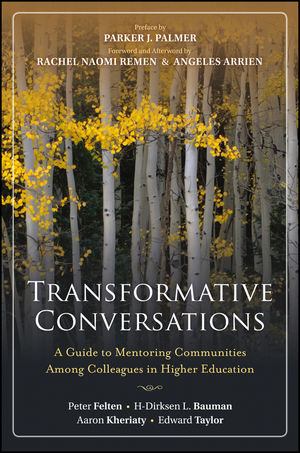
I have not only previously referred to Transformative Conversations: A Guide to Mentoring Communities Among Colleagues in Higher Education by Peter Felten, H-Dirksen L. Bauman, Aaron Kheriaty, and Edward Taylor (Jossey-Bass, 2013), but also Bob Trube’s review of it (see Reclaiming Conversations?). None-the-less this is such a significant topic and resource for Faculty Ministry/Emerging Scholars Network (FM/ESN), I wanted to be sure to highlight Bob’s review as InterVarsity’s Faculty Ministry Leadership Team (FMLT) meets this week in Madison, WI (September 23 – 25). Pray for us as we prayerfully consider, plan, and take next steps in ministry over the course of this academic year and the next five. As you have suggestions — maybe even directly related to transformative conversations in the higher education, please email me. ~ Thomas B. Grosh IV, Associate Director of ESN, editor of ESN’s blog and Facebook Wall.

Transformative Conversations: A Guide to Mentoring Communities Among Colleagues in Higher Education
The world of higher education can often be more de-formative than formative, given the pressures, politics, and financial pressures. The technologizing of higher education raises further questions of relating to large virtual networks of students and colleagues and having very few experiences of real collegiality with flesh and blood colleagues.
The four authors of this book believe they have found a way to change that. Their journey began with a Fetzer Institute program and a mentoring experience with Rachel Naomi Remen and Angeles Arrien who have worked with formational communities in other contexts. They then set out to form “formational mentoring communities” at each of their institutions.
So what is a formational mentoring community? Most basically, it is a safe place for mutual conversation among peers about the important questions of meaning, calling and values and how each other are living these out. For these communities to work, they need to be characterized by hospitality, safety, courage, honesty, trust, diversity, humility, accountability and friendship.
The authors go on to describe the practical questions of how to form the groups–place, frequency, how to invite people, size of the group and so forth. And in a chapter on collaborative stewardship, they go on to describe practicalities of facilitating such groups.
Most compelling to me in this book is the power these authors find in real relationships with four to eight as opposed to the formalized or virtual myriads of relationships. They really did find the conversations transformative as they regained or found a deep sense of meaning and connection with call in their lives. They also found this transforming relationships with students, such as when the faculty in one group at Gallaudet (a college for the hearing impaired) took the coverings off the windows in their offices so that students could SEE when they were in. An important caveat these authors affirm is that these groups cannot be institutionalized but must be informal and voluntary. This cannot become a “program” for humanizing the university, but rather a contagious process.
The authors idealism about the possibility of significant institutional change coming through the proliferation of these groups surprises me. But the narrative of the impact of these groups and the practical resources for beginning such groups will certainly encourage others to attempt such groups whether or not these have widespread impact. The chance to recover a sense of call, meaning and value to ones work would seem to be incentive enough.
Bonus:
Transformative Professional Development with Educators posted on the Fetzer Institute‘s website.
As you have thoughts/stories of reclaiming transformative conversations and mentoring relationships, please share below and/or email the Emerging Scholars Network (ESN). ESN will be focusing upon this theme in the coming months.
————–
Note to all our readers: As we have done previously, ESN encourages you to read a book before you comment upon it 🙂 It’s our intention that reviews such as those offered by Bob will not only provide opportunity for dialogue by those who have read the material, but also serve as teasers — helping our readers discern what books to place in their personal and book discussion group queue. If you have books you desire to review and/or have reviewed, please email ESN.
Bob Trube is a former Associate Director of Faculty Ministry and Director of the Emerging Scholars Network. He blogs on books regularly at bobonbooks.com. He resides in Columbus, Ohio, with Marilyn and enjoys reading, gardening, choral singing, and plein air painting.

Leave a Reply